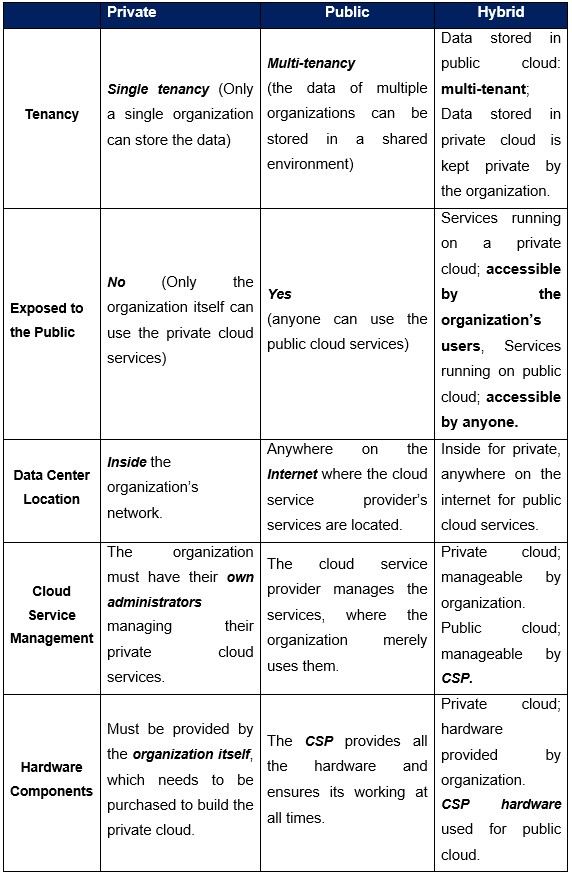Hybrid Cloud. Hybrid cloud is a computing environment that connects a company’s on-premises private cloud services and third-party public cloud into a single, flexible infrastructure for running the organization’s applications and workloads.
Hybrid Cloud Working Principle. It’s a mix of public and private cloud resources with a level of orchestration between them which gives an organization the flexibility to choose the optimal cloud for each application or workload and also to move workloads freely between the two clouds as circumstances change. This exclusive feature enables the organization to meet its technical and business objectives more effectively and cost-efficiently than it could be with public or private cloud alone.
A Comparison between Hybrid, Public and Private Cloud

Types of Hybrid Cloud
Hybrid Monocloud. It is a hybrid cloud with one cloud provider which is essentially an extension of a single public cloud provider’s software and hardware stack to the customer’s on-premises environment so that the exact same stack runs in both locations. The two environments are tethered together to form a single hybrid environment, managed from the public cloud with the same tools used to manage the public cloud provider’s infrastructure.
Hybrid Multicloud. It is an open standards-based stack that can be deployed on any public cloud infrastructure; that means across multiple providers as well as on-premises. It gives an organization the flexibility to move workloads from vendor to vendor and environment to environment as needed and to swap out cloud services and vendors for any reason.
DIFFERENCE BETWEEN MONOCLOUD & MULTICLOUD

What benefits could you get from Hybrid Cloud?
Flexibility and division of labor enabled by the hybrid cloud can offer significant benefits to almost any organization in several areas including the following: –
Security and Compliance. Hybrid cloud lets your organization deploy highly regulated or otherwise sensitive workloads in a private cloud, while still being able to deploy less-sensitive workloads to public cloud services.
Scalability & Resilience. One cannot always predict when workload traffic will spike and even when you can predict spikes, one cannot always afford to purchase additional private cloud capacity for those spikes only. Hybrid cloud lets you scale up quickly, inexpensively, and even automatically using public cloud infrastructure and then scale back down when the surge subsides, all without impacting the other workloads running on your private cloud.
Resource Optimization & Cost Saving. Hybrid cloud gives your IT more options and flexibility for deploying workloads in a way that makes the best use of your on-premises investments and your overall infrastructure budget. It also allows you to change that deployment in response to changing workloads or new opportunities.
What future do you see for the Hybrid Cloud Infrastructure? Share your views!





